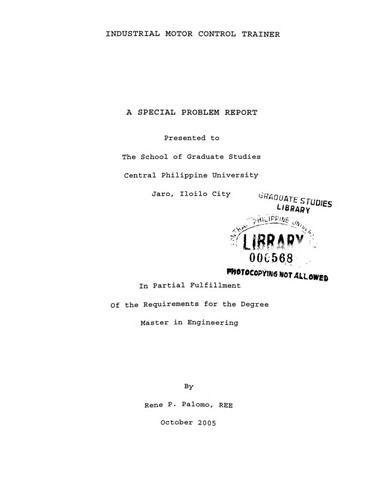Industrial motor control trainer
| dc.contributor.adviser | Java, Alberto A. | |
| dc.contributor.author | Palomo, Rene P. | |
| dc.date.accessioned | 2022-09-02T01:36:49Z | |
| dc.date.available | 2022-09-02T01:36:49Z | |
| dc.date.issued | 2005 | |
| dc.identifier.citation | Palomo, R. P. (2005). Industrial motor control trainer (Unpublished Master's special paper). Central Philippine University, Jaro, Iloilo City. | en_US |
| dc.identifier.uri | https://hdl.handle.net/20.500.12852/2249 | |
| dc.description | Abstract only | en_US |
| dc.description.abstract | The study of an Industrial Motor Control Trainer for the students is a contribution to the Electrical Engineering Department of Western Visayas College of Science and Technology. It is a solution to the students’ problem on industry application particularly for the fresh graduates looking for a job. Industries of today are highly advanced when it comes to electric motors. They have come up to many types of motor controls. It is high time that hands on for motor starting and motor controls be made available to the students. The study of electricity is like a study of air. You don’t learn by merely looking at it, rather, by feeling it or sensing its presence. It is with the recognition of the importance of the power of electricity. In every tertiary level institution, be it of technological, engineering or vocational advocacy, subjects in electricity or electric power are often part of the curriculum. With the demands of vocational courses, as well as professional electrical courses, the curricula offerings for electrical subjects are being strengthened, either by the provision of competent instructional staff, or the establishment of adequately functional laboratory and skill facilities to cater the needs of the industry and to achieve the instructional goals of the institution. To answer this problem, the proponent of this study aims to design and construct an industrial motor control trainer as an instructional device in teaching motor controls in the electrical engineering program. The findings of the study show that: 1. The trainer could perform more than twenty laboratory exercises efficiently. 2. The trainer can be use in applying the principles, theories and functions of industrial motor control trainer. 3. The trainer can be use as a demonstration unit to the students by showing the different electrical circuits that the trainer could perform. 4. The trainer can be use to discover, create or formulate new electrical circuit in the motor control. 5. The trainer can perform as a fault simulator to develop students’ skills and knowledge in electrical circuits or trouble shooting. 6. The device is economical in terms of construction and maintenance. 7. The trainer is made of light material to facilitate transferring and mobility. 8. Necessary precautions have been observed to insure maximum effectiveness and safety. Based on the findings of the study, the conclusion is given: The industrial Motor Control Trainer can be designed and constructed. Based on the conclusions drawn, it is recommended that: 1. The result of this study be disseminated to the field in order that administration and electrical engineering instructors will be informed of its use. 2. The Industrial Motor Control Trainer should be used as an instructional device in the teaching of Electric Motor Control. 3. The preparation of modules and instructional manuals be encouraged among electrical engineering instructors to improve classroom instruction. 4. Electrical Engineering instructors be encouraged to construct and improve the model using electronically controlled system for advancement of instructional process in electrical engineering. 5. A rack of electric motor be provided to further improve the gadget. 6. Financial support from government and non-government agency for the mass production of the trainer be extended to those who desire to undertake the job. 7. A replication of this study be made using another sample in a different setting. | en_US |
| dc.format.extent | 69 leaves | en_US |
| dc.language.iso | en | en_US |
| dc.subject.ddc | GSL Theses 620.0072 P186 | en_US |
| dc.subject.lcsh | Electric motors | en_US |
| dc.subject.lcsh | Electric motors--Study and teaching | en_US |
| dc.subject.lcsh | Electrical engineering--Study and teaching (Higher) | en_US |
| dc.subject.lcsh | Teaching--Aids and devices | en_US |
| dc.title | Industrial motor control trainer | en_US |
| dc.type | Special paper | en_US |
| dcterms.accessRights | Not publicly accessible | en_US |
| dc.description.bibliographicalreferences | Includes bibliographical references | en_US |
| dc.contributor.chair | Molina, Dany C. | |
| dc.contributor.committeemember | Griño, Lara Elaine O. | |
| dc.contributor.department | School of Graduate Studies | en_US |
| dc.description.degree | Master in Engineering | en_US |


